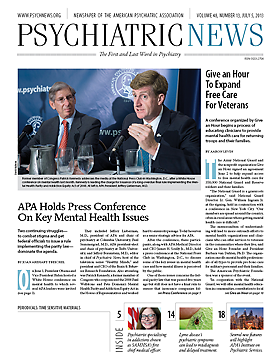“We are in the midst of a national mental health care crisis with respect to the provision of mental health benefits, including psychotherapy, just as national health care reform, the Affordable Care Act, is being implemented,” said Susan Lazar, M.D., at APA’s 2013 annual meeting in San Francisco in a symposium titled “Psychotherapy: Expanse, Education, and Efficacy.”
Lazar, a psychiatrist in private practice and a member and former chair of the Committee on Psychotherapy of the Group for the Advancement of Psychiatry (GAP), spoke about the cost-effectiveness of psychotherapy. She said that even in the wake of enactment of the strongest laws ever in this country mandating appropriate coverage and nondiscrimination against the coverage of care for psychiatric patients, access to psychotherapy and other psychiatric treatments is under attack from insurance companies.
“For the past three years, many insurance companies, including Cigna, United Healthcare, and Kaiser Permanente, began severe restrictions on mental health benefits, including psychotherapy,” she said. She emphasized that the patients who are most in need of more prolonged and intensive psychotherapy are typically the patients whose treatment and services are threatened.
Lazar cited dozens of studies demonstrating the efficacy and cost-effectiveness of long- and short-term psychotherapy for depression, anxiety, posttraumatic stress disorder, schizophrenia, and personality disorders in both children and adults. (She edited a review of the subject, Psychotherapy Is Worth It: A Comprehensive Review of Its Cost-Effectiveness, cowritten by GAP’s Committee on Psychotherapy and published by American Psychiatric Publishing.)
“The preponderance of the literature reviewed attests overall to the cost-effectiveness of the psychotherapies for the conditions examined,” Lazar said. “While ‘cost-effective’ treatments can yield cost savings in health care costs, disability, and other societal costs, ‘cost-effective’ does not mean ‘cheap’ but describes treatments that are of high value and effectiveness even if they increase direct treatment costs.
“Psychotherapy is an effective and often highly cost-effective medical intervention for many serious psychiatric conditions,” Lazar said. “It is at times the first-line and most important treatment and at other times augments the efficacy of psychotropic medication. The patients who are most in need of more prolonged and intensive psychotherapy are those with personality disorders and those with chronic complex psychiatric conditions, often including severe anxiety and depression. These patients, if inadequately treated, are extremely costly to society in increased medical and emergency services, disability, and, for certain groups, destructive and antisocial behavior. Certain children and adolescents with learning disabilities and those with severe psychiatric disorders also require more than brief treatment.
“Other diagnostic groups for whom psychotherapy is effective, cost-effective, and at times cost-saving in other medical and societal costs include patients with schizophrenia, anxiety disorder (including posttraumatic stress disorder), depression, or substance abuse. In addition, psychotherapy for the medically ill with concomitant psychiatric illness often lowers medical costs, improves recovery from medical illness, and at times even prolongs life compared with similar patients not given psychotherapy.” ■
